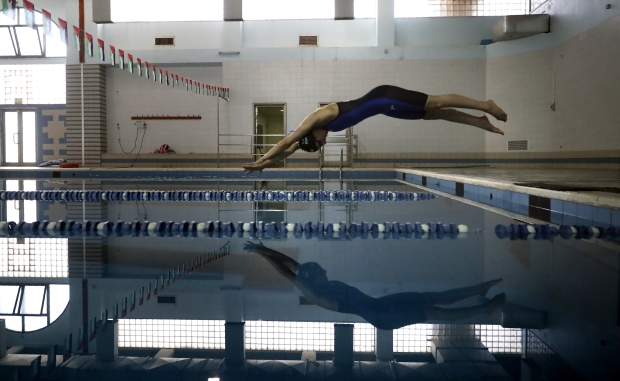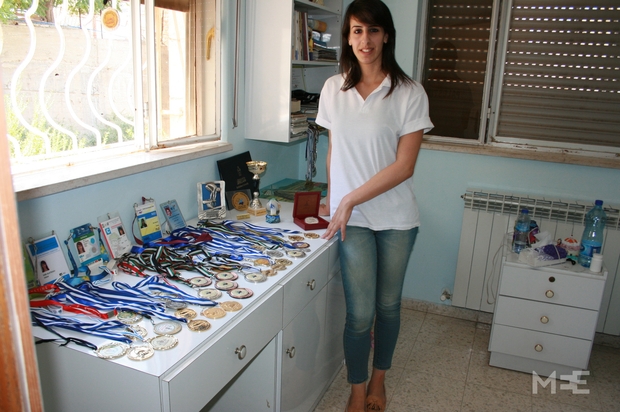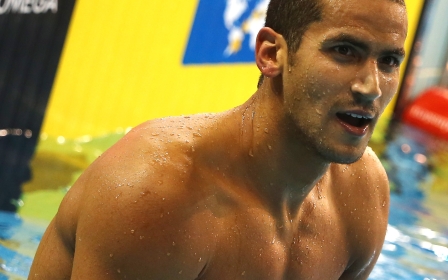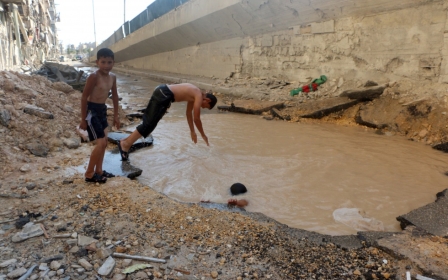Palestinian swimmer overcomes odds to make a splash at Rio Olympics

BEIT SAHOUR, Palestine – A whistle blows in the echo-filled swimming pool and Mary al-Atrash plunges into the water, barely making a splash. She gracefully glides across the crisp blueness and then flips and turns, before making her way back.
It is 8.30 in the morning and the 22-year-old Palestinian swimmer is training hard ahead of the Rio Olympics in August, where she will compete against the world’s best swimmers in the 50 metres freestyle. But her preparations for the long-awaited international sporting event have been at best bumpy, hampered by her hometown’s own limited means, as well as the fraught reality of living under Israeli occupation.
There are no Olympic-sized swimming pools in the Palestinian territories, so she trains in the West Bank’s largest pool, which is only 25 metres long. There are also no starting platforms, making proper training particularly difficult and putting her at a disadvantage compared to swimmers from many other parts of the world that train year-round in fully equipped facilities.
“Training every day in a half-Olympic pool and then suddenly moving on to a 50 metre one in a competition is difficult,” Atrash, sitting in her living room, tells Middle East Eye.
“A 50-metre pool seems so big to me,” she adds with a sad smile.
Palestine’s participation in the summer Olympics is fairly recent. It made its debut in the 1996 Atlanta Games, with a team of two athletes. Since then, participation has steadily grown, though Palestine has yet to claim any medals. A total of six athletes will head to Rio this summer, making it the largest delegation so far. Despite a growth in participation and an overall improvement in athletic performance, however, Palestinian athletes and trainers say a lack of funding and access to the required facilities continues to shackle their progress.
There is no national Palestinian swimming team, so Atrash trains alone with little access to competition or encouragement from peers. She occasionally gets to travel abroad for competitions and for training camps - experiences she says have been instrumental to her achievements. She mostly relies on her long-time coach Musa Nawawra, who guides her daily physical drills. She trains twice a day for a total of four hours, six days a week.
“We always say that out of 1000 swimmers, only one will make it,” Nawawra tells MEE. “Mary is that one swimmer who has always been a hard worker, determined to accomplish something.”
Nawawra says without sufficient funding and access to proper resources, however, even the most talented and hard working athletes will not be able to live up to their full potential. He says a lack of infrastructural resources such as swimming pools in schools or universities means that it is impossible to scout, let alone train young talents and form a team. He also faults the Palestinian educational system, which favours examinations and homework over participation in after-school sports.
Producing first-class swimmers, he says, requires up to 15 years of consistent training; a difficult task he says, given that up until a few years ago there were only outdoor pools in Palestine, which meant that swimmers could only practice in the summer months.
“What we’ve often ended up doing is last-minute intensive trainings abroad ahead of competitions,” Nawawra says. “Everyone knows this is simply not enough.”
Split second difference
Swimmers say the sport is in itself physically and mentally demanding, where improving one’s time by even one second could take years of gruelling training, and requires a high level of motivation. In swimming, like running, a fraction of a minute makes all the difference during competitions. Having access to inadequate facilities has just made it even more challenging to make the kinds of strides necessary to meet international standards.
Her best time is 29.91 seconds, significantly slower than the 25.28 seconds required to officially qualify for the Games. Palestinian swimmer Ahmed Jibril, a second-time Olympian, will participate in the 200 metres freestyle. Both have been invited under the Olympic Universality quota, designed to allow nations whose athletes have not reached the qualifying minimum to enter a male and female athlete in each sport, regardless of time - a reality that is not lost on Atrash.
Despite the obvious setbacks, Atrash, who started swimming at the age of six, says she remains hopeful in her own ability to improve, and is excited to have the opportunity to participate, even if it may not involve a podium finish.
“We know what our capacity is, and we know who and what we are,” she says. “But I believe that we still have to do the best we can, as well as remain ambitious and determined.”
The Palestine Olympic Committee announced that in addition to the two swimmers, runner Mohammed Abu Khoussa will run in the 100 and 200 metre sprints, and three athletes with dual German and Palestinian citizenships will represent Palestine: Mayada Sayyad in the marathon, Christian Zimmermann in dressage riding and Simon Yacoub in judo.
Denied access to training facilities
Nearby Jerusalem has superior training facilities and several indoor Olympic pools, but Israel prevents Palestinian residents of the West Bank from accessing Jerusalem without permits, which are difficult to come by. A large concrete wall, multiple military checkpoints and several Jewish settlements surround the Bethlehem area - illustrating how the decades-old conflict hampers the prospects of young Palestinians.
Israel has been competing in the summer Olympics since 1952, and has amassed a total of seven medals over the years in judo, sailing and canoeing events. This year, Israel will send 47 athletes to the Olympics, its largest ever delegation participating in 16 different events, among them six swimmers.
Standing in her sunny bedroom, Atrash admires the dozens of medals and trophies she has earned over the years, which she has carefully laid out on her desk. She says she is animated by the opportunity to be able to represent Palestine, even though Palestinians have endured a prolonged Israeli military occupation and their hopes of gaining independent statehood have been dashed by over two decades of on and off negotiations with Israel.
Proud to wave flag for Palestine
She says the political reality is indeed difficult to escape or overcome and believes sports are crucial, particularly for many young Palestinians who often see little meaning and purpose to their lives beyond daily confrontations with Israeli soldiers.
As an athlete, participating in the Olympic Games is the ultimate accomplishment and a life-long dream for her. As a Palestinian, it is additionally an opportunity to represent their cause abroad. Atrash says she is most looking forward to waving the Palestinian flag during the opening ceremony while dressed in Palestinian national dress.
“I am very proud and happy to be part of the team representing Palestine. It’s a big responsibility, we’re not just going there to swim and come back,” she says. “We are going to send a message of who we are, our cause, as well as the difficulties we face. We carry all of this with us wherever we go.”
In the final weeks leading up to the games, Atrash says she will head to neighbouring Amman, Jordan’s capital, followed by Algeria, where she will practice with the much better equipped national swimming teams in a final effort to improve her form and her time.
Atrash, who recently graduated from Bethlehem University with a degree in business, says she will continue to fight for recognition in her society, which still values formal education over sports, and abroad, where the Palestinian cause has been eclipsed by the region’s other violent conflicts.
Saeda al-Atrash, Mary’s mother, sitting pensively in their airy living room in Beit Sahour, says that she is immensely proud of her daughter who has overcome personal obstacles as well as those that have been beyond her control, and dedicated so much of her time and energy to a sport she loves.
“Mary is ready for success, she’s been training hard since she was young, she knows what she wants.”
This article is also available on the Middle East Eye's French edition.
New MEE newsletter: Jerusalem Dispatch
Sign up to get the latest insights and analysis on Israel-Palestine, alongside Turkey Unpacked and other MEE newsletters
Middle East Eye delivers independent and unrivalled coverage and analysis of the Middle East, North Africa and beyond. To learn more about republishing this content and the associated fees, please fill out this form. More about MEE can be found here.






